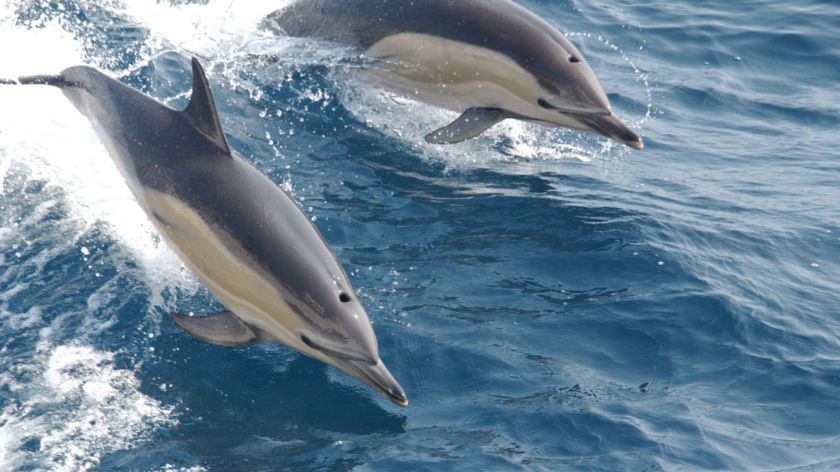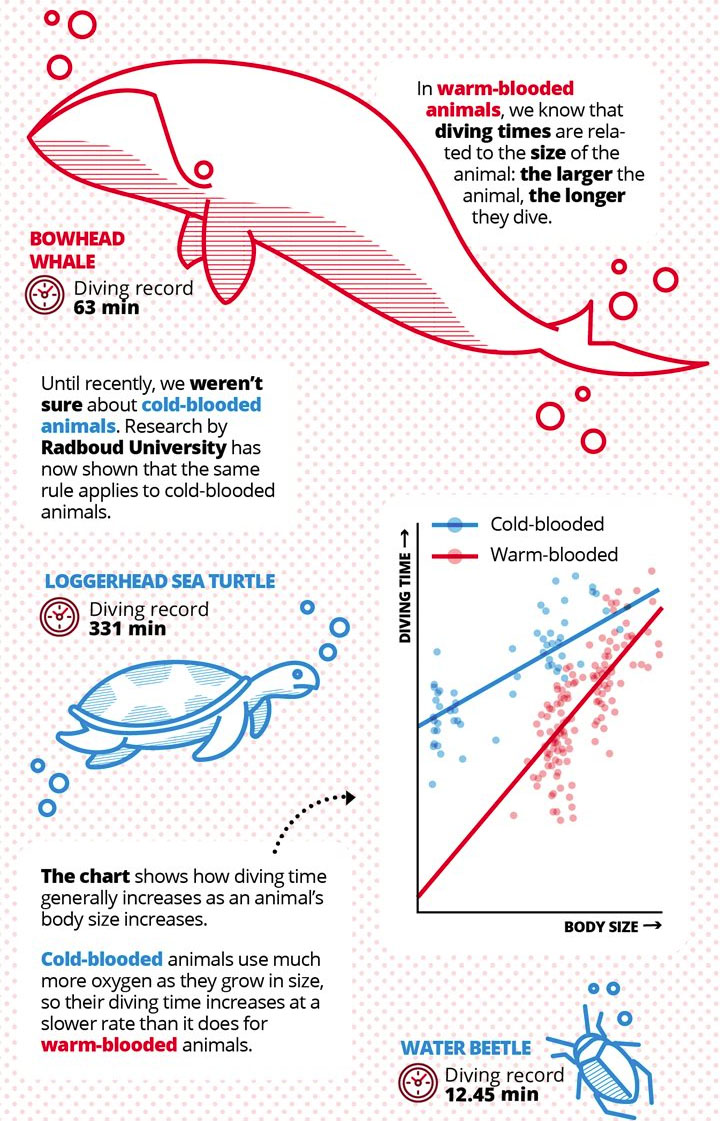Sea turtle beats diving beetle in breath-holding contest
-
 Some dolphin species can stay under water for more than one hour. Photo: Wikimedia Commons (CC0)
Some dolphin species can stay under water for more than one hour. Photo: Wikimedia Commons (CC0)
Whether you are a turtle, human or blue whale, the amount of time you can remain under water is determined by the same biological laws for everyone, as discovered by Nijmegen biologists in new research published recently.
Who doesn’t remember their swimming exam? You only pass if you can also swim a number of metres under water. This isn’t a problem for most people – if they really have to, people can stay under water for minutes.
This length of time is not random, as shown by a new scientific paper by Nijmegen animal ecologists published this week in the journal Proceedings of the Royal Society B. A general rule applies to all animals on earth: the bigger they are, the longer they can remain under water. The exact duration depends on the amount of oxygen they can take with them, and how quickly they use it.
Evolution theory
For many animals, it is useful to be able to remain under water for a long time. They find food and breed there or keep out of sight of predators. Wilco Verberk, who led the study: ‘You see water beetles and newts quickly snatching a mouthful of air on the water surface before diving under again. In this way they stay hidden from birds.’
Verberk admits that at first sight the results of the study sound obvious, but this is not true. ‘We already knew that for warm-blooded creatures dive duration depends on body mass, but this has never been demonstrated for cold-blooded creatures. We now show that this fundamental principle is true for cold-blooded creatures too, and is therefore universal.’ This is really interesting from a biological point of view, he adds, as in ecology people are constantly looking for universal rules – just think of the theory of evolution.

However, there is a difference between the two groups, as the Assistant Professor at the Animal Ecology department discovered. Cold-blooded animals – creatures such as insects and reptiles that can adjust their body temperature based on external temperatures – can remain underwater relatively longer than warm-blooded creatures (that have a constant, high temperature, such as mammals and birds). For example, a water beetle can hold its breath for longer than 12 minutes, but the much larger cormorant barely lasts 3 minutes.
The study shows that the dive duration of an animal does not only depend on body size – and therefore the amount of air an animal can take with it under water – but also the amount of oxygen it uses. Verberk: ‘Cold-blooded animals don’t use oxygen as quickly as warm-blooded animals. One of the reasons for this is that their body temperature is generally lower in the water.’
The laws of nature apply to humans too
The difference in oxygen uptake also explains a second difference between cold-blooded and warm-blooded creatures that Verberk discovered: the dive duration of reptiles and insects increases less quickly as they become larger, than it does for birds and mammals. ‘In both groups, oxygen usage becomes more efficient as their body mass increases, but this is even more true for warm-blooded than for cold-blooded animals.’
There was a lot of discussion between subject specialists whether warm-blooded and cold-blooded creatures actually have a different oxygen uptake and dive duration, he says. ‘Because we’ve now studied both very small animals and very large animals – from small beetles to blue whales – we are now able to demonstrate that there really is a difference in dive duration and that this is exactly in line with differences in oxygen usage.’
Stopwatch
Verberk and his colleagues – from England, South Africa, the US and Canada – did not stand at the side of the water with a stopwatch for all 286 animals studied (62 of which were cold blooded). They compiled existing datasets with information on dive duration and body mass (‘there are thousands of these’) and added new data on small water beetles to it themselves. This was painstaking work that took 10 years, sighs the animal ecologist.
The results are interesting for a number of reasons, explains Verberk. Firstly, it gives researchers a calibration point. ‘If I tell you that a cormorant can remain under water for 10 minutes, you can now understand better whether this is a long or short time.’ If the dive duration deviates, this is perhaps a sign that an animal has a special physical adaptation that is worth investigating, such as more or better red blood cells for oxygen storage.
Dinosaurs
The findings are also an additional indication that extinct swimming dinosaurs such as ichthyosaurs were probably warm blooded – a question that palaeontologists have been unable to resolve for years. Verberk: ‘Our analyses show that larger warm-blooded divers are able to dive for much longer.’
Loggerhead sea turtles hold the record for the longest documented dive, remaining underwater for longer than 5 hours. And humans? The ecologists saw that the laws of nature apply to them too. The dive duration is four minutes (Verberk: ‘we took the maximum values reported for each species’), which is precisely in line with this ‘rule’.



